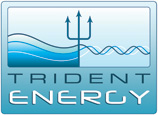Trident Energy, the independent developer of generator solutions for the offshore renewable energy industry, today announces the successful demonstration of real-time control of low cost linear generator technology for wave energy – a global first.
Major barriers to the success and commercial viability of wave energy are the difficulties in adapting to changing wave conditions, and capturing the potential of every wave. To date, control systems designed to capture and utilise wave energy have been unable to harness the full potential of each wave owing to the slow response of hydraulic or geared mechanisms.
Trident Energy’s new control technology allows for real-time adaptation, so the potential of each wave is fully harnessed. Trident Energy’s new control technology goes hand-in-hand with their linear generator, as illustrated by the successful demonstration of real-time control of their full-scale linear generator at their test facility in Lowestoft, Suffolk.
Not only does Trident Energy’s breakthrough represent a development for the commercial viability of wave energy in the long term, particularly by reducing the cost of electricity generated by waves, it has a more immediate impact for other renewable applications which can utilise real-time control technology, namely offshore wind turbines.
Offshore turbines need auxiliary power, with most utilising diesel generators to provide this. Trident Energy’s generator and control technology can provide a diverse source of wave-generated auxiliary power for wind turbines, reducing the need for offshore refuelling. This protects the wind turbine against damage, reduces costs and improves safety by minimising the need for personnel access to the wind turbine. By reducing offshore wind reliance on diesel, Trident Energy will help make a green energy source ‘greener’.
Today’s announcement is testament to the UK’s ocean energy expertise, with a variety of British partners making key contributions, including the University of Cambridge, Rockwell Automation, Westbury Control Systems, RJW Engineering and Small & Co. Trident Energy used almost an entirely UK-based supply chain to deliver this milestone and will look to maintain a high UK content as the technology is commercialised.
Commenting on today’s announcement, Steve Packard, CEO of Trident Energy said: “We are delighted to have developed an enabling technology that can benefit the offshore wind industry with reduced costs and greater safety. We are also excited about how our new controllable Power Take Off can support the wider wave energy industry. Furthermore, following the test at our facility in Lowestoft, Suffolk, and with our UK based partners, today’s announcement shows that the UK is at the forefront of technology development for the global ocean energy industry.”
Dr Richard McMahon, Cambridge University Electrical Engineering Senior Lecturer added: “The University of Cambridge has a rich history of being at the cutting edge of developing new electrical and control systems, with this latest project continuing that trend. The ability to control the generator in real-time opens up the door for new system control strategies for wave energy devices.”
Additionally, Rob Haynes, Power & Energy Account Manager, Rockwell Automation said: “Through our system integrators we have been able to supply a scalable solution utilising a suite of standard Rockwell Automation control, visualisation and I/O components to achieve Trident Energy’s desired result. The same architecture can be expanded to allow for greater power production and will assist Trident Energy as they progress with the commercialisation of their linear generator.”
